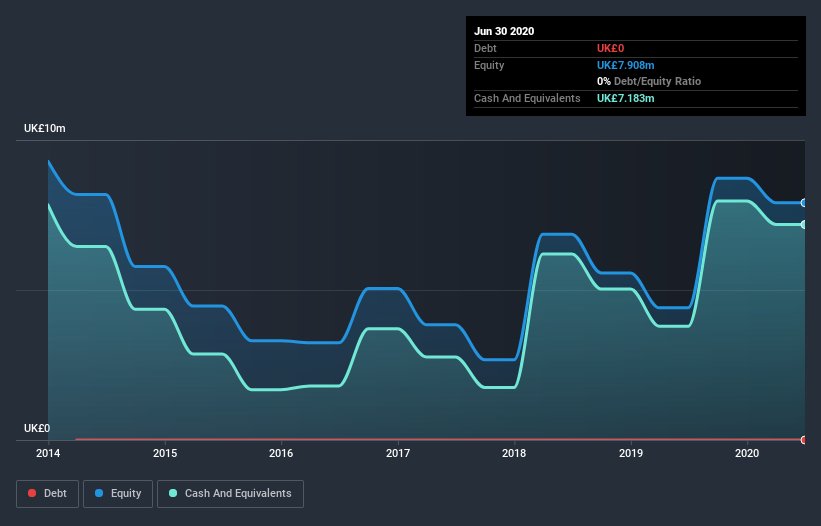- United Kingdom
- /
- Software
- /
- AIM:BIRD
Here's Why We're Not At All Concerned With Blackbird's (LON:BIRD) Cash Burn Situation
There's no doubt that money can be made by owning shares of unprofitable businesses. For example, biotech and mining exploration companies often lose money for years before finding success with a new treatment or mineral discovery. But while history lauds those rare successes, those that fail are often forgotten; who remembers Pets.com?
Given this risk, we thought we'd take a look at whether Blackbird (LON:BIRD) shareholders should be worried about its cash burn. In this report, we will consider the company's annual negative free cash flow, henceforth referring to it as the 'cash burn'. Let's start with an examination of the business' cash, relative to its cash burn.
View our latest analysis for Blackbird
Does Blackbird Have A Long Cash Runway?
You can calculate a company's cash runway by dividing the amount of cash it has by the rate at which it is spending that cash. When Blackbird last reported its balance sheet in June 2020, it had zero debt and cash worth UK£7.2m. In the last year, its cash burn was UK£1.9m. So it had a cash runway of about 3.8 years from June 2020. A runway of this length affords the company the time and space it needs to develop the business. The image below shows how its cash balance has been changing over the last few years.

How Well Is Blackbird Growing?
It was fairly positive to see that Blackbird reduced its cash burn by 21% during the last year. On top of that, operating revenue was up 35%, making for a heartening combination We think it is growing rather well, upon reflection. Of course, we've only taken a quick look at the stock's growth metrics, here. This graph of historic revenue growth shows how Blackbird is building its business over time.
How Hard Would It Be For Blackbird To Raise More Cash For Growth?
While Blackbird seems to be in a decent position, we reckon it is still worth thinking about how easily it could raise more cash, if that proved desirable. Companies can raise capital through either debt or equity. One of the main advantages held by publicly listed companies is that they can sell shares to investors to raise cash and fund growth. By looking at a company's cash burn relative to its market capitalisation, we gain insight on how much shareholders would be diluted if the company needed to raise enough cash to cover another year's cash burn.
Since it has a market capitalisation of UK£66m, Blackbird's UK£1.9m in cash burn equates to about 2.9% of its market value. That means it could easily issue a few shares to fund more growth, and might well be in a position to borrow cheaply.
So, Should We Worry About Blackbird's Cash Burn?
It may already be apparent to you that we're relatively comfortable with the way Blackbird is burning through its cash. For example, we think its cash runway suggests that the company is on a good path. On this analysis its cash burn reduction was its weakest feature, but we are not concerned about it. Looking at all the measures in this article, together, we're not worried about its rate of cash burn; the company seems well on top of its medium-term spending needs. Its important for readers to be cognizant of the risks that can affect the company's operations, and we've picked out 2 warning signs for Blackbird that investors should know when investing in the stock.
Of course, you might find a fantastic investment by looking elsewhere. So take a peek at this free list of interesting companies, and this list of stocks growth stocks (according to analyst forecasts)
If you’re looking to trade Blackbird, open an account with the lowest-cost* platform trusted by professionals, Interactive Brokers. Their clients from over 200 countries and territories trade stocks, options, futures, forex, bonds and funds worldwide from a single integrated account. Promoted
Valuation is complex, but we're here to simplify it.
Discover if Blackbird might be undervalued or overvalued with our detailed analysis, featuring fair value estimates, potential risks, dividends, insider trades, and its financial condition.
Access Free AnalysisThis article by Simply Wall St is general in nature. It does not constitute a recommendation to buy or sell any stock, and does not take account of your objectives, or your financial situation. We aim to bring you long-term focused analysis driven by fundamental data. Note that our analysis may not factor in the latest price-sensitive company announcements or qualitative material. Simply Wall St has no position in any stocks mentioned.
*Interactive Brokers Rated Lowest Cost Broker by StockBrokers.com Annual Online Review 2020
Have feedback on this article? Concerned about the content? Get in touch with us directly. Alternatively, email editorial-team (at) simplywallst.com.
About AIM:BIRD
Blackbird
Develops and operates a cloud-based video editing and publishing software platform under the Blackbird name in the United Kingdom, rest of Europe, North America, and internationally.
Flawless balance sheet with moderate risk.
Market Insights
Community Narratives



